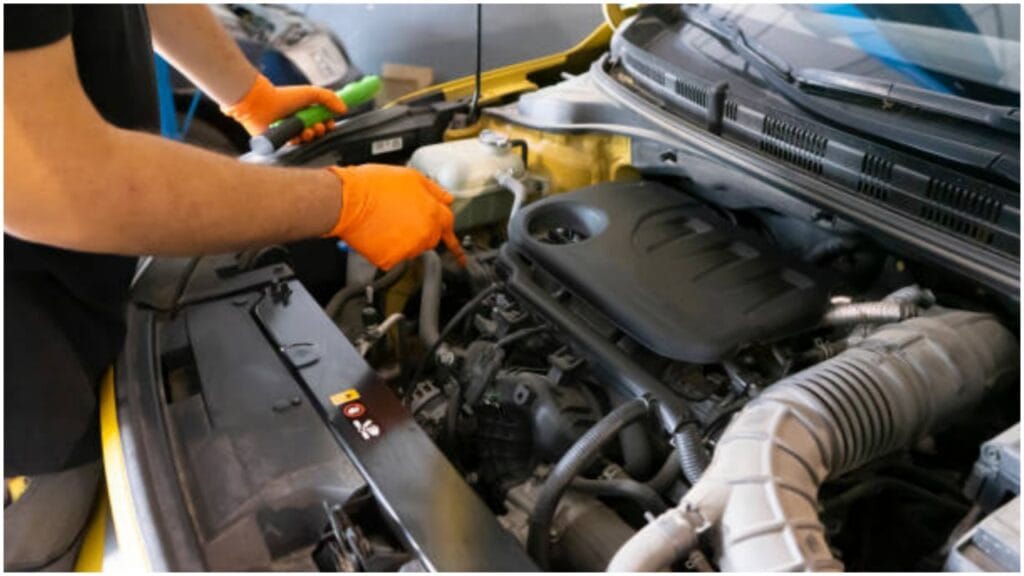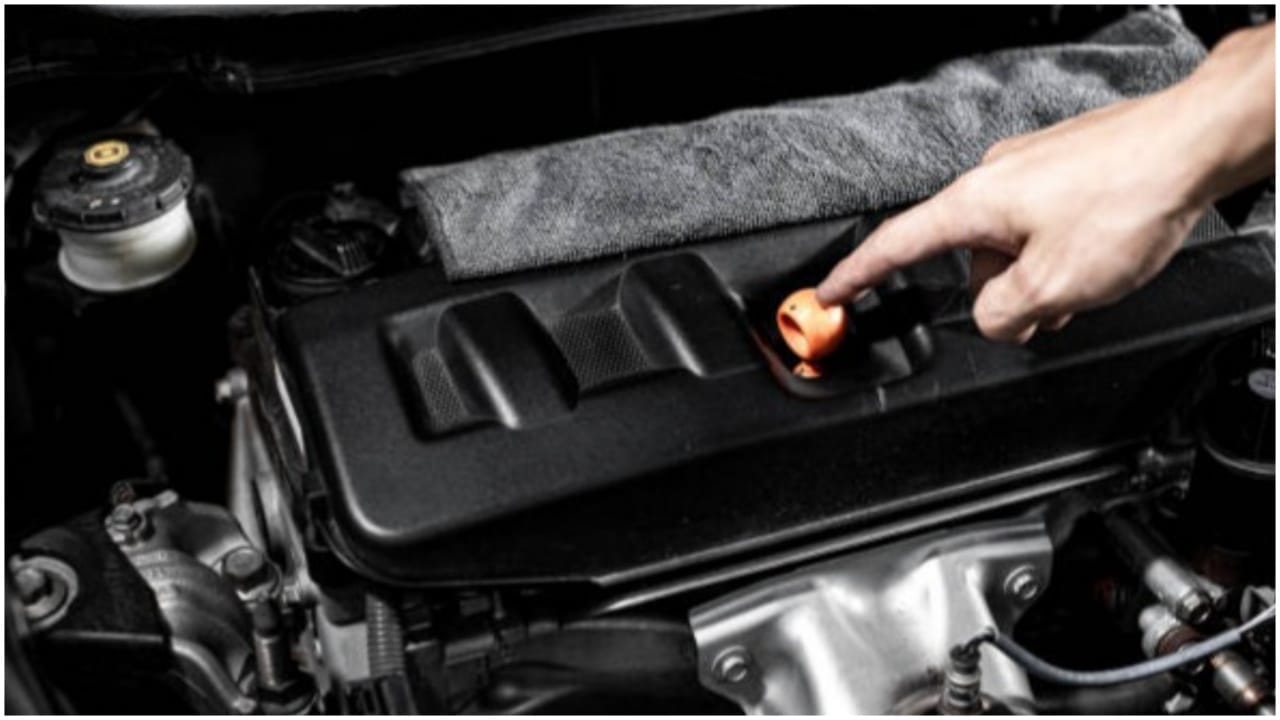We’ve spent years dissecting diesel engine maintenance, from the intricacies of oil viscosity to the precise functions of fuel additives. Consider this your guide, informed by practical experience and technical understanding.
For diesel engines, both high-quality engine oil and fuel additives play crucial roles in maintaining performance and longevity, but they address different aspects of engine health. High-quality engine oil provides lubrication and protection against wear, while fuel additives enhance fuel quality and combustion, cleaning injectors, and improving fuel efficiency.
We’ll explore the specific types of oils and additives, and how to determine when and why each is necessary. You’ll gain the knowledge to make informed decisions for your diesel’s optimal performance. First, let me give you a little idea about diesel engines so that you can understand the matter easily.
Understanding Diesel Engine Needs
Diesel engines, more than gasoline ones, operate under intense pressures and heat. This dictates specific oil formulations designed to combat shear and soot buildup. Fuel quality is equally critical. Cetane rating directly affects combustion efficiency, and contaminants like water can wreak havoc on sensitive injectors.
Therefore, understanding your engine’s typical operating conditions—heavy hauling, frequent cold starts, or prolonged idling—is crucial. This knowledge allows you to select the appropriate high-quality oil and targeted fuel additives, optimizing performance and longevity.
What Are Diesel Oil Additives?
Diesel engines, more than gasoline ones, operate under intense pressures and heat. This dictates specific oil formulations designed to combat shear and soot buildup. Fuel quality is equally critical. Cetane rating directly affects combustion efficiency, and contaminants like water can wreak havoc on sensitive injectors.
Therefore, understanding your engine’s typical operating conditions—heavy hauling, frequent cold starts, or prolonged idling—is crucial. This knowledge allows you to select the appropriate high-quality oil and targeted fuel additives, optimizing performance and longevity.
The Benefits of Using Oil Additives
Using oil additives in a diesel engine can significantly boost performance and longevity. They reduce friction, leading to improved fuel economy and reduced wear on critical engine parts. Additives help maintain oil viscosity under extreme temperatures, ensuring consistent lubrication.
They also neutralize harmful acids and prevent sludge buildup, keeping the engine cleaner. This translates to smoother operation, fewer repairs, and an extended engine lifespan, especially under heavy-duty conditions.
What engine oil does for a diesel engine
Engine oil in a diesel engine performs crucial roles. It lubricates moving parts, reducing friction and wear under high pressures. It cools the engine by carrying away heat generated during combustion.
It cleans by suspending contaminants like soot and sludge, preventing buildup. It also protects against corrosion by neutralizing acids formed from fuel combustion. Essentially, it maintains engine health and efficiency.
Diesel Engine Challenges
Diesel engines face unique challenges: high compression generates extreme heat, demanding robust oil. Fuel quality varies, impacting combustion and causing injector issues. Soot and acid buildup from combustion require specialized oil and additives.
Cold starts strain the engine, needing cetane boosters. Water contamination corrodes fuel systems, demanding demulsifiers. Heavy-duty operation leads to significant wear, necessitating additives for lubrication and protection. These challenges require targeted maintenance for optimal performance and longevity.
Overview of diesel engine maintenance
Diesel engine maintenance centers on proactive care, addressing the unique challenges of high compression, heat, and fuel variability. Regular, diesel-specific oil and filter changes combat soot and heat, while fuel system maintenance, including filter and water separator checks, prevents contamination.
Clean air filters ensure efficient combustion, and a well-maintained cooling system prevents overheating. Targeted fuel additives, like cetane boosters, detergents, and demulsifiers, optimize fuel quality and protect against cold-weather issues and corrosion. Understanding these needs allows for tailored maintenance, maximizing engine longevity and performance.
Top Diesel Engine Oil

Optimal diesel engine oils meet API CK-4 standards, handling high pressures and temperatures. They control soot, maintain viscosity, and neutralize acids.
Enhanced detergency cleans, preventing sludge. Choosing the correct viscosity for your climate ensures proper lubrication, protecting and extending engine life.
CAM2: Performance and affordability
CAM2 oils balance performance and affordability, offering reliable diesel engine protection. They often meet or exceed industry standards like API CK-4, ensuring adequate soot control and wear protection.
While not always the top-tier, they provide consistent viscosity and detergency, suitable for everyday use and moderate workloads. For budget-conscious operators needing dependable lubrication, CAM2 presents a viable option.
Castrol: Advanced technology and protection
Castrol oils leverage advanced technology to deliver superior diesel engine protection. They’re formulated to withstand extreme pressures and temperatures, minimizing wear and extending engine life.
Their sophisticated additive packages excel at soot control, viscosity stability, and corrosion prevention. Castrol’s focus on innovation means their oils often exceed industry standards, ensuring optimal performance and reliability for demanding diesel applications.
Chevron: Durability and extensive testing
Chevron diesel engine oils prioritize durability through robust formulations and rigorous testing. Their Delo line, for instance, offers excellent wear, oxidation, and deposit protection, crucial for heavy-duty applications.
Chevron’s LubeWatch® oil analysis program further ensures reliability by monitoring oil condition and predicting maintenance needs, maximizing equipment uptime. This focus on durability and testing makes Chevron a trusted choice for demanding diesel operations.
Mobil 1: Superior performance under high stress
Mobil 1 synthetic diesel engine oils excel in high-stress environments. Their advanced formulations provide superior protection against wear, even under extreme temperatures and pressures. They offer exceptional soot control, maintaining viscosity and preventing sludge buildup.
Mobil 1’s synthetic base oils and additive packages ensure optimal lubrication, minimizing friction and maximizing fuel efficiency. This translates to extended engine life and reliable performance in demanding applications, making it a top choice for those prioritizing maximum protection and performance.
Shell: Innovation and quality assurance
Shell diesel engine oils emphasize innovation and quality assurance. Their formulations incorporate cutting-edge technology to provide superior engine protection and performance. Shell invests heavily in research and development, resulting in oils that excel in soot control, wear protection, and viscosity stability.
Rigorous testing ensures their products meet or exceed industry standards. Their focus on quality extends to their base oils and additive packages, providing reliable lubrication and protection for demanding diesel applications. Shell aims to deliver consistent performance and extended engine life through its commitment to innovation and quality.
Valvoline: Trusted for consistent results
Valvoline diesel engine oils are trusted for delivering consistent results and reliable protection. They formulate their oils to meet or exceed industry standards, ensuring robust performance across various operating conditions.
Valvoline focuses on providing balanced protection against wear, oxidation, and deposit formation. Their oils maintain viscosity stability and offer effective soot control, contributing to engine cleanliness and longevity.
Valvoline’s long-standing reputation for quality and reliability makes them a dependable choice for diesel engine maintenance, offering consistent performance and peace of mind.
Lucas Oil
Lucas Oil Products, Inc. is a prominent American manufacturer and distributor of high-performance automotive additives and lubricants. They cater to a wide range of vehicles, including cars, trucks, motorcycles, and racing applications.
Their product line encompasses engine oils, fuel treatments, gear oils, and various specialized additives. Lucas Oil is known for its focus on high-quality formulations designed to enhance engine performance, protect against wear, and extend the lifespan of vehicle components. Their products are popular among both everyday drivers and professional racers.
Engine Oil vs. Fuel Additives: A Comparative Analysis

Engine oil and fuel additives serve distinct yet complementary roles in diesel engine maintenance. Engine oil provides essential lubrication, cooling, and cleaning, protecting against wear and heat. It’s a foundational element for engine health. Fuel additives, conversely, target specific fuel-related issues.
Cetane boosters enhance combustion, detergents clean injectors, and demulsifiers remove water. While oil ensures basic engine function, additives address performance and longevity by optimizing fuel quality. The choice isn’t “either/or,” but rather a balanced approach tailored to engine needs and operating conditions.
Engine Oil: The Lifeline of a Diesel Engine
Engine oil is the diesel engine’s lifeline. It lubricates moving parts, reducing friction and wear under high pressures. It cools the engine, dissipating heat from combustion.
It cleans, suspending soot and contaminants, preventing sludge. It also protects against corrosion, neutralizing acidic byproducts. High-quality oil is essential for optimal performance and longevity.
How engine oil protects and lubricates
Engine oil protects and lubricates diesel engines through several key mechanisms. It forms a thin film between moving parts, reducing friction and preventing direct metal-on-metal contact, which minimizes wear. This film also acts as a barrier, protecting against corrosion and the formation of rust.
Furthermore, engine oil disperses heat generated by combustion and friction, preventing overheating. Additives in the oil enhance these properties, maintaining viscosity under extreme temperatures and neutralizing harmful acids, ensuring consistent lubrication and protection.
Different types of engine oil for diesel engines
Diesel engines utilize various oil types tailored to their demanding conditions. Conventional oils suit older engines, while synthetic blends offer improved performance. Full synthetics provide superior protection in extreme conditions, excelling in wear protection and soot control.
Heavy-duty diesel oils, meeting API CK-4 standards, are designed for commercial applications, handling high loads and extended drain intervals.
Selecting the appropriate oil type, based on engine age, operating conditions, and manufacturer recommendations, is essential for optimal engine health and longevity.
Benefits of using high-quality engine oil
High-quality engine oil offers significant benefits for diesel engines. It provides superior lubrication, reducing friction and wear, extending engine life. It maintains viscosity under extreme temperatures, ensuring consistent protection.
Enhanced detergency cleans, preventing sludge and deposit buildup. It neutralizes acids, protecting against corrosion. High-quality oils also improve fuel efficiency and reduce emissions. Ultimately, they maximize performance, reliability, and longevity, minimizing costly repairs and downtime.
Fuel Additives: Boosting Diesel Performance
Fuel additives play a crucial role in optimizing diesel engine performance. They address specific fuel-related issues that engine oil alone cannot resolve. Cetane boosters improve combustion, enhancing cold starts and reducing emissions. Detergents clean injectors, ensuring proper fuel spray and efficiency.
Lubricity additives protect fuel system components from wear, while demulsifiers separate water, preventing corrosion and damage. These additives work synergistically with engine oil, boosting overall performance, fuel efficiency, and longevity. They are especially beneficial in challenging operating conditions or when dealing with lower-quality fuels.
How fuel additives improve fuel quality
Fuel additives enhance diesel fuel quality through targeted actions. Cetane boosters raise the cetane number, improving combustion efficiency, especially in cold starts. Detergents remove deposits from injectors, ensuring proper fuel atomization and spray patterns, optimizing fuel delivery.
Lubricity additives add a protective layer, reducing friction in fuel pumps and injectors, preventing wear. Demulsifiers separate water from fuel, preventing corrosion and microbial growth. These actions refine fuel characteristics, leading to cleaner combustion, improved performance, and extended component life.
Types of diesel fuel additives
Diesel fuel additives target specific problems. Cetane boosters improve combustion. Detergents clean injectors, ensuring proper spray. Lubricity additives reduce wear on fuel pumps.
Demulsifiers separate water, preventing corrosion. Stabilizers prevent fuel degradation. Cold-weather additives stop fuel from gelling. Each type optimizes fuel quality. This improves engine performance.
Benefits of using diesel fuel additives
Using diesel fuel additives yields tangible benefits. Improved combustion from cetane boosters means easier cold starts and cleaner emissions. Clean injectors, thanks to detergents, ensure optimal fuel spray, boosting power and efficiency.
Lubricity additives protect fuel pumps and injectors, prolonging their life. Demulsifiers prevent water damage, while stabilizers combat fuel degradation during storage. These additives contribute to a more efficient, reliable, and longer-lasting diesel engine, especially in harsh conditions.
Maintenance and Performance
Maintaining peak diesel performance hinges on a balanced approach to engine oil and fuel additives. Regular oil changes with high-quality, diesel-specific oil are foundational, ensuring proper lubrication, cooling, and cleaning.
Fuel additives, used judiciously, address specific needs: cetane boosters for cold starts, detergents for injector cleanliness, and demulsifiers for water removal.
Monitoring engine performance and operating conditions dictates additive use. Proactive maintenance, combining quality oil with targeted additives, maximizes efficiency, longevity, and overall engine health.
Choosing the Right Product for Your Diesel Engine
Diesel engine longevity and performance rely on distinct, yet complementary, fluids: engine oil and fuel additives. Engine oil, formulated with specific viscosities and API ratings, lubricates moving parts, cools, cleans, and prevents corrosion within the engine itself.
Conversely, fuel additives, like cetane boosters, cleaners, and anti-gel agents, enhance fuel properties and maintain the fuel system. While oil ensures mechanical integrity, additives optimize combustion, fuel flow, and system cleanliness.
Choosing the right products, based on engine specifications and driving conditions, is crucial for maximizing efficiency and minimizing wear.
How to select the best engine oil
Selecting the optimal engine oil for your diesel engine requires careful consideration of several factors. Begin by consulting your vehicle’s owner’s manual, which provides manufacturer-specified viscosity and API/ACEA ratings.
Understanding viscosity, indicated by SAE ratings like 15W-40, is crucial for ensuring proper oil flow at varying temperatures. Next, prioritize oils that meet or exceed the recommended API or ACEA standards, as these signify quality and performance.
Choose between mineral, synthetic, or semi-synthetic oils based on your engine’s needs and driving conditions. Heavy-duty use or extreme temperatures often necessitate synthetic oils for superior protection. Matching these factors to your engine’s requirements guarantees optimal lubrication, performance, and longevity.
How to pick the right fuel additive
Assess your diesel’s needs: cleaning, cetane boost, cold protection, or lubricity. Choose reputable brands. Match additives to driving conditions. Read labels for compatibility and dosage.
Multi-function additives are versatile; specialized ones address specific issues. Proper selection optimizes performance and longevity.
Things to avoid when using these products
Avoid using additives in excess; follow the instructions. This will improve engine performance. Do not mix incompatible oils or additives. Regular oil changes are essential, additives do not replace them.
Never use expired products. Resolve engine symptoms; additives are not a solution. Incorrect use can damage your engine, but it will not do any good.
Viscosity and temperature adaptability
Viscosity dictates oil flow, varying with temperature. SAE grades indicate cold and hot performance. Lower “W” ratings aid cold starts; higher numbers protect hot temperatures.
Multi-grade oils adapt to varied climates. Follow manufacturer specs; consider your driving conditions for optimal engine protection.
Detergent and dispersant qualities
Detergents clean engine deposits. Dispersants suspend these particles. This prevents sludge buildup. Both are vital for engine health. They keep oil passages clear.
Clean oil improves performance. Deposits reduce efficiency. Use oils with proper detergent and dispersant additives.
Compatibility with engine specifications
Engine oil and fuel additive compatibility is crucial. Always consult your vehicle’s manual. Oil must meet API/ACEA ratings. Additives should match the fuel type.
Incorrect choices harm engines. Modern engines, with emission systems, are sensitive. Use only specified products to prevent costly damage.
Price versus performance value
Price matters. Performance matters more. Cheap oil can harm engines. Good oil protects. Synthetic oil costs more. It lasts longer. Additives vary in price. Some work well.
Some do not. Buy quality additives. They improve performance. They prevent problems. Long-term costs matter. Quality saves money.
Best Practices and Recommendations

Prioritize your diesel engine’s longevity by strictly adhering to the manufacturer’s guidelines for oil and additive use. Opt for high-quality, API/ACEA-rated oils and maintain recommended oil change intervals.
Employ targeted additives for specific needs like fuel system cleaning or cold weather protection, always following dosage instructions. Regularly monitor engine performance, addressing issues promptly rather than relying solely on additives.
Use quality diesel fuel, maintain clean filters, and prioritize preventative maintenance, keeping detailed records of all services performed.
Synergistic Use
Synergistic use of engine oil and fuel additives means understanding how they work together, not against each other. Engine oil protects the engine’s internal parts, while fuel additives enhance fuel combustion and cleanliness.
Use high-quality oil meeting engine specs. Add fuel additives for specific needs, like cleaning or cetane boost. Don’t over-rely on additives; they complement, not replace, proper oil maintenance.
Regular oil changes remain vital. This combined approach maximizes engine performance and longevity.
Maintenance Schedule
Regular maintenance is key. Change oil and filters as scheduled. Replace fuel filters, too. Clean air filters often. Check coolant levels. Inspect belts and hoses. Look for leaks.
Use fuel additives correctly. Follow your owner’s manual. Heavy use needs more frequent checks. Modern engines are sensitive. Keep maintenance records. Proper care extends engine life.
Evaluating Aftermarket Diesel Oil Additives
Carefully evaluate aftermarket oil additives. Prioritize reputable brands with verifiable testing. Check for compatibility with your engine and oil type. Critically assess manufacturer claims; look for supporting data.
Research potential side effects on engine components. Weigh the cost against benefits. Be cautious of long-term effects. Consult professionals for advice. Remember, quality oil and regular changes are crucial; additives complement, not replace, these practices.
Protection in extreme conditions
Extreme conditions demand specialized protection for diesel engines. Synthetic oils, with their superior temperature stability, are vital, maintaining viscosity in both scorching heat and frigid cold.
High-temperature viscosity grades prevent wear, while low-temperature grades ensure cold starts. Fuel additives play a crucial role: anti-gel agents prevent fuel solidification, lubricity additives combat ULSD’s dryness, and cetane boosters enhance combustion.
High-quality fuel system cleaners keep modern high-pressure fuel injectors clean. Choosing appropriate oils and additives, tailored to specific extreme environments, safeguards engine longevity and performance.
Fuel economy improvements
Optimizing diesel fuel economy involves a multifaceted approach. Correct viscosity engine oil, especially synthetics, minimizes engine friction, enhancing efficiency. Cetane boosters and fuel system cleaners improve combustion and fuel atomization.
Lubricity additives reduce fuel pump and injector friction. Regular maintenance, including air filter replacements, tire inflation, and engine tune-ups, ensures peak performance.
Smooth driving, avoiding excessive idling and aggressive acceleration, further contributes to fuel savings. A synergistic combination of quality oil, strategic additives, and responsible driving maximizes diesel fuel economy.
Performance enhancement claims
Approach performance enhancement claims for diesel additives with skepticism. Differentiate factual data from marketing hype, seeking quantifiable improvements.
Reputable manufacturers provide test results; independent certifications add credibility. Engine condition impacts results; older engines may show greater change.
Additives supplement, not replace, maintenance. User reviews offer insights, but results vary. Consult professionals for expert opinions. Compare product claims and data.
Be wary of exaggerated claims. Prioritize data-backed evidence and expert advice for informed decisions.
FAQ’s
Aftermarket engine oil additives
Aftermarket oil additives demand scrutiny. Seek brands with proven testing, ensuring compatibility with your engine. Critically assess claims, favoring independent verification. Weigh potential side effects against cost.
Modern oils are balanced; additives may disrupt this. Expert consultation is vital. Prioritize quality oil and regular changes; additives are supplementary, not replacements. Approach claims with informed skepticism, prioritizing engine health.
Best friction-reducing oil additive
Finding the “best” friction reducer is complex. Many products exist. Research reputable brands. Look for independent testing. Verify claims. Consider your engine type. Some additives use molybdenum.
Others use PTFE. Nanoparticle additives are newer. Check for compatibility. Follow the manufacturer’s instructions. Overdosing can harm engines. Assess long-term effects. Read user reviews. Consult mechanics.
They offer expert advice. Understand that reduced friction may not equal increased lifespan. Some additives improve fuel economy. Others enhance power. Balance cost and benefit. High-quality engine oil already has friction reducers. Additives are supplements. Use with caution. Regular oil changes are vital.
Anti-friction oil additive
Anti-friction oil additives aim to reduce engine wear. They do this by creating a protective layer on metal surfaces. Molybdenum disulfide and PTFE are common ingredients. Nanoparticle additives are also used.
Reputable brands provide test data. Verify compatibility with your engine oil. Follow dosage instructions carefully. Overdosing can be harmful. These additives can improve fuel economy and performance.
However, they are not a replacement for regular oil changes. They supplement the oil’s existing properties. Consider long-term effects. Read user reviews and consult mechanics. Choose reputable brands.
Best engine oil cleaning additive
Engine oil cleaning additives fall into two categories: pre-oil change flushes and ongoing treatments. Reputable brands like Liqui Moly offer effective engine flushes, while STP provides continuous cleaning treatments.
Prioritize well-known brands and verify compatibility with your engine. Critically assess product claims, seeking verifiable benefits. User reviews and professional evaluations offer real-world insights.
Remember, additives supplement, not replace, regular oil changes with quality oil. Always adhere to your vehicle’s owner’s manual recommendations for optimal engine cleanliness.
Conclusion
In the realm of diesel engine maintenance, both engine oil and fuel additives play crucial, yet distinct, roles. Engine oil, selected for appropriate viscosity and API/ACEA ratings, provides vital lubrication and protection.
Fuel additives, chosen for specific needs like cleaning or cetane boosting, enhance fuel performance. While additives can supplement maintenance, they never replace regular oil changes and adherence to manufacturer guidelines.
Careful product selection, prioritizing reputable brands and verified claims, is essential. Avoid overdosing additives and mixing incompatible products. Understand the potential risks and benefits, prioritizing engine health.
Ultimately, a balanced approach combining quality oil, strategic additive use, and consistent maintenance ensures optimal diesel engine performance and longevity.

